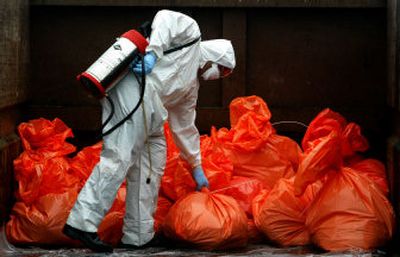Iowa school betting on bird flu

ATLANTA – Think bird flu will become a worldwide threat this summer? Wanna put some money on that?
In an unusual effort to better predict the advance of a potential flu pandemic, public health experts will be staked about $100 apiece to bet on the spread of bird flu. This type of grim futures market has also been created to predict hurricanes and temporarily, a few years ago, terrorist attacks.
In this case, the goal is to develop a faster way to collect expert opinion about the potential spread of a deadly disease outbreak.
“Farmers have used futures markets for decades to make decisions about what crops to plant. We’re just borrowing that concept to help people in public health and health care make decisions about the future,” said Dr. Phil Polgreen, a University of Iowa assistant professor of medicine who helped create the project.
It’s being funded by the Robert Wood Johnson Foundation, which is donating nearly $250,000. The University of Iowa, which set up futures exercises for hurricane predictions, box office receipts and presidential elections, will operate the bird flu enterprise.
Organizers hope to recruit at least 100 epidemiologists, veterinarians and other medical experts from around the world for the two-year project. They will be asked to join an online trading system akin to agricultural futures markets, in which investors buy contracts that businesses will be able to deliver certain volumes of, say, corn or pork bellies.
But in this project, the contracts represent not the likelihood of a good corn harvest but the odds that deadly bird flu will infect a human in Hong Kong by July 1.
“Yes” contracts on that prediction are currently trading at 43 cents. That means the experts think there’s a 43 percent chance of that occurring.
At issue is the deadly H5N1 strain of bird flu, which has killed 167 people in 10 countries since 2003 but so far hasn’t been easily spread from person to person. Health officials fear it will mutate into a highly contagious form that could kill millions worldwide.
Since 1988 the University of Iowa has operated a project called the Iowa Electronic Markets (IEM), which aggregates predictions to forecast major events. Much of the focus has been elections, and the Iowa markets have generally outperformed political polls.
A predictive market for seasonal flu, operated in Iowa and North Carolina, correctly predicted the current level of flu activity in an area 71 percent of the time, even though the predictions were made before any solid surveillance reports were available. The market had a 50 percent success rate at predicting flu activity a week in advance, according to a recent report in the journal Clinical Infectious Diseases.
Organizers predicted the bird flu market should prove less controversial than previous efforts, such as one asking experts to predict terrorism or assassinations, and the New Jersey-based Robert Wood Johnson Foundation cautiously agreed.
“It might be considered controversial if it’s not well understood,” said the philanthropy’s Robert Hughes.
He noted that public health experts won’t be gambling their own money, so opportunities for financial gain are extremely limited.